soryang
soryang's JournalElectoral Reform Law Passes in South Korean National Assembly

(Image source- JTBC News 12.27)
The number of seats determined by district elections to seats in the National Assembly is the same as the prior election 253 seats. The number of seats determined by proportional representation is also the same 47 seats. However, the old (Hare) method is applied to 17 of the 47 seats. A new method of selecting proportional representation is applied to 30 of the 47 seats. An interlocking restriction of 50 percent is applied to proportional allocation of the seats to prevent the emergence of "excess seats." It is believed that the reform will most disadvantage the largest parties, namely the ruling Democratic Party and the main opposition party, the Liberty Korea Party, in the upcoming April 15, 2020 election for the National Assembly. The LKP has already registered a satellite party with the election commission in an attempt to field a minor party list which might benefit from the calculations and circumvent limitations in the proportional representation reform law.

(Image source- JTBC News 12.27)
The graphic above is a hypothetical projection of the results of the new fast track electoral reform law passed today in the Korean National Assembly, calculated with numbers from the 2016 general election. Note that some of the parties have changed in their composition since then, particularly the People's Party. So in this simulation, the Democratic Party loses 8 seats and the Liberty Korea Party loses 10. The People's Party (hypothetically) would gain 13 seats and the Justice Party would gain 5. Theoretically, this 13 seat gain would primarily acrue to the Barunmirae Party, the principal offspring of the People's Party in existence now. It is no coincidence that the Barunmirae Party and the Justice Party were the biggest supporters of the electoral reform and had to be cajoled by the Democratic Party to accept a compromise which downsized the proportional representation from 75 seats, as originally proposed, to 47 seats. Another significant aspect of the reform is the lowering of the age to vote to 18 years.
The exact nature and mechanics of all the new changes in the electoral reform law are hard to find. Past discussions of electoral reform changes have included the notion of regional proportionality in representation as opposed to a simple national proportionality. The details of those determinations and their mechanics are not clear as yet. In response to questions, the Justice Party floor leader said "the people don't need to know how it works," believe it or not. One wonders how many journalists actually do know how it works at this point. In the original reform proposal, representation in regional seats more than 30 percent of the total for the region, would limit supplemental proportionate representation. Naturally, this would adversely affect the largest parties.
.
 .
.
(Source: YTN News, 12.28) Happening again, "animal National Assembly." The speaker of the assembly's platform is occupied (by a "human wall" of Liberty Korea Party representatives); a physical fight is ongoing. Speaker Moon center being physically assaulted by members of the Liberty Korea Party attempting to stall the passage of the electoral reform bill.
There will be two votes on the ballot in each district, one vote for the candidate to represent the district among the 253 district representative seats. The second vote to select a preferred party list nominating candidates for proportional representation. One thing is for certain, the LKP has been adamantly opposed to the fast track reform of the electoral system but it passed today anyway, in spite of all their illegal demonstrations, violence, threats, and physical intimidation outside the Assembly, and obstruction even inside the National Assembly itself today. LKP threats of a filibuster notwithstanding, the legislation passed. Now only the fast track prosecutorial reform bill is pending. Again this in the face of LKP stonewalling, demonstrations, and threats of filibuster. During the acrimony and disorder in the Assembly today, catcalling from the LKP represenatives was met with one telling response from a Democratic Party member, "we'll see how you do in the next election." The desperation of the far right party is palpable.
South Korea: LKP Thugs Threaten National Assembly

(Source- 닥쳐라정치, 12.16 ) Hwang Kyo-ahn, Liberty Korea Party leader, heads an unlawful demonstration of unruly right wing followers obstructing the entrance to the South Korean National Assembly Building.
 00
00
(Source- JTBC News, 12.16) Hwang Kyo-ahn stands front and center of a group gathered unlawfully under LKP direction in front of the National Assembly building in Seoul, Korea.
Ambassador Harris, has signaled the US preference for the militarists on the far right in South Korea. The US flags at this unlawful Liberty Korea Party demonstration trespassing on the National Assembly grounds are their symbol of US bona fides. Their thuggish tactics at the democratic seat of government in South Korea are a political disgrace. The trespassers and bullies in front of the National Assembly building aim to shut down the National Assembly because they don't believe in democratic government. The fascist right is out of power and now an element of the opposition. They lost power when Park Geun-hye was impeached in April 2017. There was almost a military coup then imposed by martial law to derail the impeachment and trial of the now imprisoned Park Geun-hye. There appears to be the possibility of a coup now. It's safe to speculate that reactionary right wing governments in the US and Japan would have no problem with that.
Some of the fascist thugs in this crowd being encouraged to fight by the LKP leader Hwang Kyo-ahn allegedly assaulted some thirty members of the Democratic Party trying to go to work inside the assembly building. Hwang encouraged the trespassers, "we're winning. Thank you for your efforts." A former governor of Gyeonggido addressed the group telling them to not feel uncomfortable approaching the Assembly building because it was "their home" and that they should "make themselves comfortable." Demonstrating within a hundred meters of the National Assembly building is unlawful. The crowd also vandalized the reserved parking spaces for specific members of the Assembly, including the Speaker of the Assembly and the leader of the Democratic Party. The right wing supporters of the LKP and Hwang forced their way through the front gates of the grounds ostensibly protected by the police guards there. A small number of demonstrators forced themselves into the building and became involved in a melee.
This is not a popular rebellion, it is groundwork being laid for martial law and a right wing coup d'etat. It's purpose is to create an atmosphere of intimidation and anarchy. The crowd is interfering with the functions of the National Legislature in a unlawful manner and directly threatening members of the Assembly that they don't like and have targeted for intimidation. Hwang had been criticized in the past by his base for not executing martial law in March or early April 2017 when the plans were in place Now he seems to be approaching the moment when he can be the man to trigger such an outcome, or at least create the circumstances where such an action can be entertained and rationalized.
This crowd wasn't that big. There is a cadre of political operatives running it supported by younger athletic men who know exactly what they are doing when they make physical contact with police and assault others.
This is a militarist right wing movement with christian evangelical support that arose out of the prior dictatorships and the prior corrupt administrations of Lee Myung-bak, and Park Geun-hye. Their goal is to overthrow the constitutionally elected government by obstructing its activities with unlawful methods including force. As predicted earlier here, the tactics take on the same characteristics as the movement in Hong Kong. The occupation of the legislative grounds and building was unprecedented. If a larger better equipped and directed police force is not present in the future, we can expect normal governance to cease in South Korea.
The parties of the left, center, and center right in South Korea need to close ranks and govern with resolve or they and their democracy will be destroyed.
US-North Korea: Maximum Pressure Leading to Maximum Failure?
The obstacle to progress in denuclearization negotiations with North Korea is still the fundamental confrontation over the step by step method versus the all or nothing, no concessions, no trust building approach favored by US officials, and the national security establishment. Most Korea "experts" inside the beltway echo chamber just refuse to acknowledge this fundamental shortcoming in the US diplomatic approach which is first a process issue, and then secondarily a matter of great substantial importance. Either that, or they just want regime change in North Korea and can't imagine bargaining with the communist dictatorship under any circumstances other than complete capitulation by the North, often referred to as the Libyan approach.
Furious Futility: Maximum Pressure in 2020
BY: RICHARD NEPHEW
NOVEMBER 15, 2019
https://www.38north.org/2019/11/rnephew111519/
“The North Koreans have always preferred a step by step approach rather than negotiating everything all at once,” Town said.
North Korea's U.N. envoy says denuclearization off negotiating table with United States
Michelle Nichols, David Brunnstrom Dec. 7, 2019
https://www.reuters.com/article/us-northkorea-usa/north-koreas-u-n-envoy-says-denuclearization-off-negotiating-table-with-united-states-idUSKBN1YB0FG
This is also the procedural approach favored by Russia, China, and South Korea.
In an interview with VOA, Jeong Se-Hyun, who advises South Korean President Moon Jae-in on unification issues, also said the U.S. should offer more incentives to persuade North Korea to give up its nuclear weapons.
"Don't act as if you're offering a carrot while really you are using a stick," said Jeong. "North Korea must first be given carrots. Then if that doesn't work, you use a whip."
As North Korea's Deadline Approaches, South Pushes US for Progress
By William Gallo VOA News December 01, 2019 10:04 AM
https://www.voanews.com/east-asia-pacific/north-koreas-deadline-approaches-south-pushes-us-progress
Economic, military, and diplomatic pressure helped bring the North Koreans to the table, but reaching a successful agreement will require carrots as well as sticks.
Lynn Rusten and Richard Johnson with Steve Andreasen and Hayley Anne Severance, Building Security Through Cooperation: Report of the NTI Working Group on Cooperative Threat Reduction with North Korea (Washington, DC: Nuclear Threat Initiative, 2019), 2, https://media.nti.org/documents/NTI_DPRK2019_RPT_FNL.pdf. (from the forward by Ernst J. Moniz and Sam Nunn)
South Korea: LKP Executive Committee rejects Na Kyung-won as Assembly floor leader
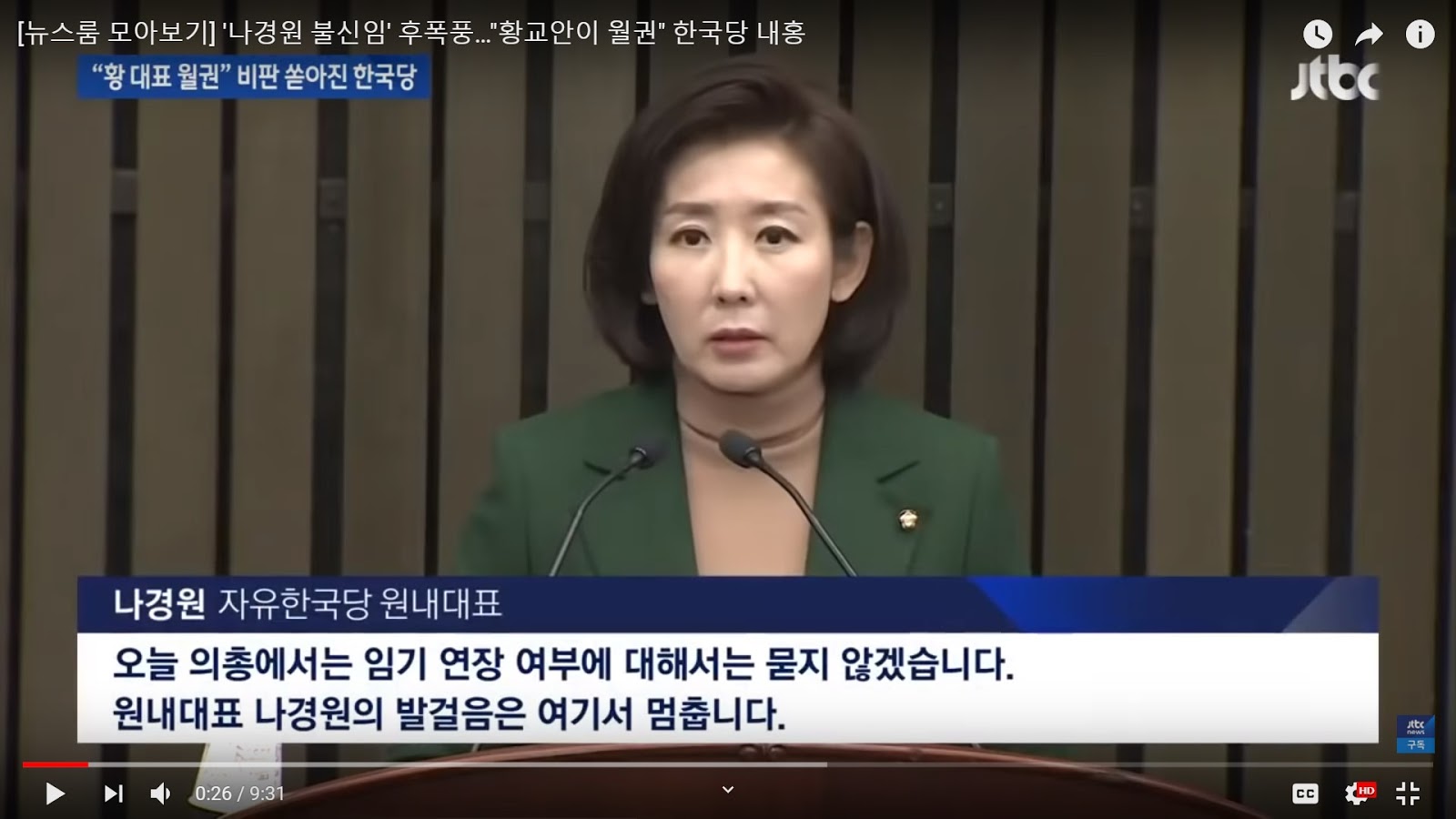
(Source- JTBC News, 12.4) Na Kyung-won, LKP floor leader in the National Assembly. "Today at the regular session, I will not question the matter of my term extension. Floor leader Na Kyung-won's foot steps stop here."
The Executive Committee of the right wing Liberty Korea Party earlier today after an all night long conference, voted not to renew Na Kyung-won's position as the Floor Leader of the opposition party in the National Assembly. It appears the conference where the decision took place was in a tent outside the Blue House grounds where LKP leader and former Prime Minister, Hwang Kyo-Ahn, had been conducting his "hunger strike" until he gave that up last week. However after he left the hospital he returned to the scene of his demonstration where his followers and supporters waited.
At the opening of the National Assembly this morning, Na somewhat bitterly, announced she would respect the decision of the LKP Executive Committee, and not take a further step as the party floor leader. This "in order to ensure the good of the people and the unity of the party." There is a storm of indignation and criticism within the Liberty Korea Party at the step taken by the so called "pro Hwang faction" in the Executive Committee. Expressions of resistance, public, private and on line to the committee's resolution was plentiful. LKP members of the National Assembly questioned the authority of the party committee to make such a decision, and maintained it was the prerogative of sitting LKP National Assembly members. Further, some felt that the committee was without authority to make such a determination when the new session of the National Assembly was not yet convened pending elections in April.
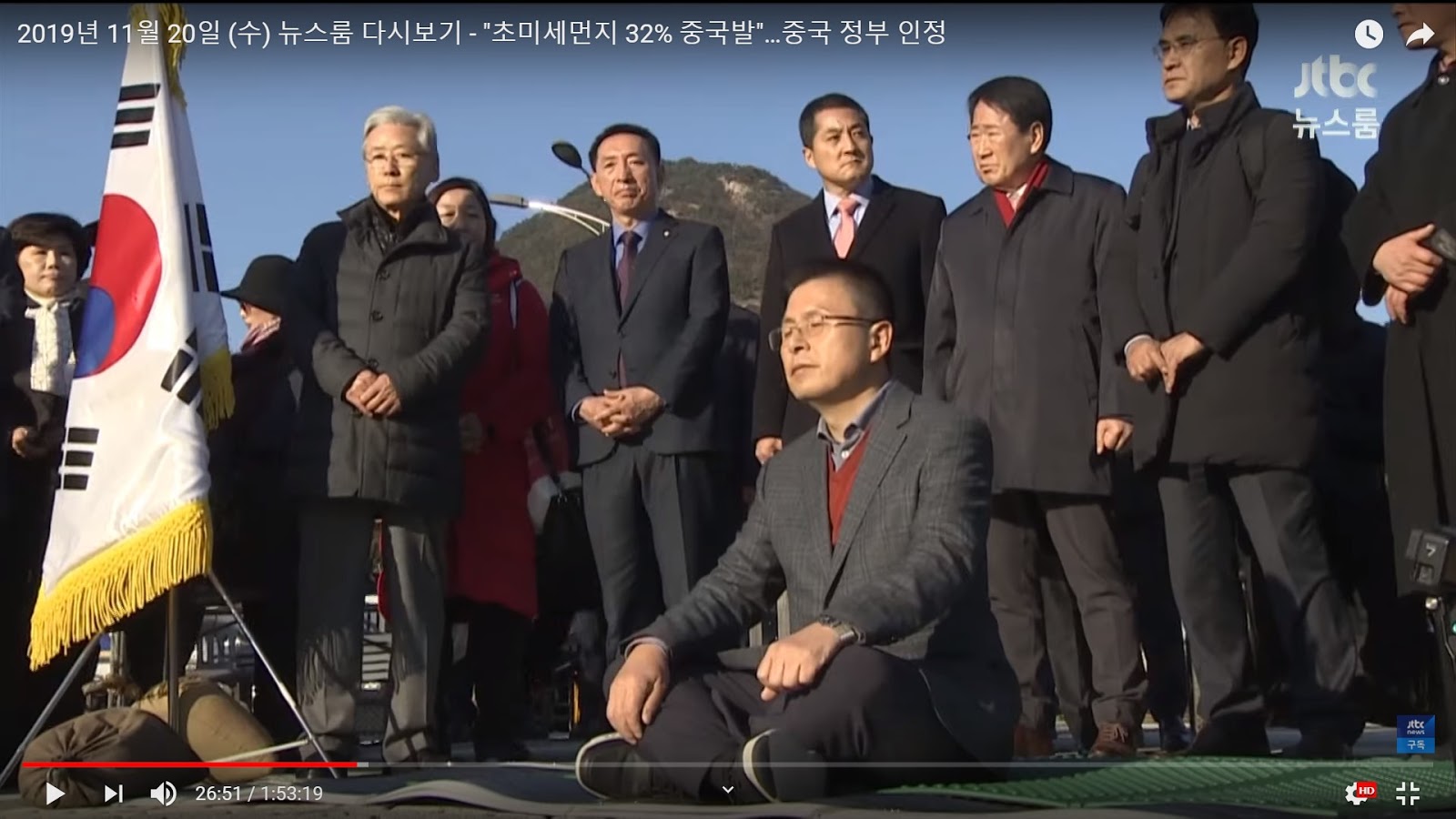
(Source- JTBC News, 11.20) Liberty Korea Party leader, Hwang Kyo-ahn on a hunger strike in front of the Blue House grounds.
The future of the right wing opposition party is in doubt at a critical time in South Korean history as the rift between Hwang and Na breaks out into the open. One wonders what Na and Hwang discussed when she visited his tent in front of the Blue House grounds after returning from her recent US visit. That the Executive Committee's action might portend the end of the Liberty Korea Party as we know it, was a fear expressed publicly by some members. One LKP assembly member openly criticized Hwang's hunger strike affecting a pose as a party reformer, attempting to sanctify the party. His head shaving and fasting reminiscent of traditional ascetic protests, previously used by revered left leaning reformers such as Kim Dae-jung who opposed the prior military dictatorships of South Korea. The omnipresence of Christian conference leaders and their followers at Hwang's demonstration are an indication of where the base of former impeached President Park's predecessor Saenuri party lay.
Hwang's holier than thou effect, is an implied but unexpressed contrast to the alleged corruption and hypocrisy of Na Kyung-won's effort to use her political position during the Lee Myung-bak presidency to obtain her daughter's admission to college. This is the very same type of behavior that was used to drive the former democratic party justice minister from power only several weeks ago. I asked three weeks ago in a previous analysis, how long would Na last?*
*Conservative LKP Leader Na Kyung-won on the Ropes? November 14, 2019
https://civilizationdiscontents.blogspot.com/2019/11/conservative-lkp-leader-na-kyung-won-on.html
The internal criticism of the Executive Committee's action by Na's supporters within the LKP suggests that Hwang has privatized the party, making it his personal domain, betraying "the interests of the people." Na had just recently declared an all out legislative confrontation with the ruling coalition in the National Assembly by carrying out a filibuster to block all pending legislation before the end of the legislative session unless the proposed fast track reform bills were set aside by the Democratic Party. Democratic Party leaders are attempting to devise a strategy in conjunction with three small minority parties to nullify the filibuster. One tactic would be to declare an end to the regular session next week followed immediately by an extraordinary sesssion of the National Assembly to pass all pending legislation. Filibusters are not allowed in extraordinary session. So the looming constitutional crisis continues. It was hoped on the right that the left would be the victim, but it appears the right may crack first under the pressure.
Hwang Kyo-ahn's hunger strike enters day 6
Hwang Kyo-ahn's hunger strike passes the six day mark. He's got a relatively small crowd of supporters, mostly religious and far right types setting up tents and making noise all day and night outside the Blue House in violation of various laws. There is a similar but smaller group outside the National Assembly. Two things could possibly happen, one, a police dispersal which could become a source of violence. The second could be the death of Hwang Kyo-ahn, the right wing leader, using the tactics of the left and occupy to attempt to thwart the fast track legislative reform legislation that will damage his party's prospects in the next election cycle. Na Kyung-won has been visiting Hwang in his tent in front of the Blue House. After the extension of the GSOMIA agreement, Hwang's hunger strike, had the appearance of some efficacy. An occupy like demonstration has emerged near the Blue House, that is reportedly in violation of different proscriptions, the first a security zone around the Blue House perimeter which Hwang's tent and the assembly nearby apparently violate. The second a violation of noise restrictions in the area. The third a violation of "anti-gypsy" proscriptions which disallow squatting or erecting quarters on public grounds for overnight occupation. The demonstrators claim there is an overriding Constitutional guarantee of political expression which protects them. Some critics dispute this. Hearing a debate on this subject, it appeared that time, place and manner restrictions are not a thing on the right for these purposes. There are similar concerns surrounding a related squatter type operation around the National Assembly grounds.
Moon Jae-in has been out of town the last few days for the ASEAN conference which Seoul is hosting in Pusan. The legal and political dilemna on the plaza and streets in front of the Blue House is apparently being handled by Blue House staff and other party leaders in his absence. Thus far, they have acted with great restraint unwilling to paint the disingenuous Hwang as a "patriotric martyr for the cause," as is portrayed on the new jackets worn by the occupiers in the streets. These squatters and their tents festooned with numerous US flags. Even if the legal grounds exist to disperse them, it would be likely to escalate into an undesirable situation. Thus far, Democratic party leaders have merely asked Hwang to have his followers leave voluntarily. Police have placed notices on the tents of their illegal status suggesting they may be removed by official action. One wonders how long this fiasco will go on.
Placards, banners and signs at demonstrators' scene, say Moon Jae-in is a communist, that he is a dictator ruining the country, that he should step down, etc. Moon's defenders point out that the incredible restraint shown by police is merely evidence of Moon's substantial resume as a defender of human rights and the principles of democracy.
South Korea: LKP leader on a "hunger strike"

(Source- JTBC News, 11.20) Liberty Korea Party leader, Hwang Kyo-ahn on a hunger strike.
Just over a month ago, in a commentary titled Political Turmoil in South Korea, I asked, "...So what will the wily LKP leaders come up with for their next move? More mass street demonstrations? Attempts by demonstrators to enter the Blue House? Violent Black Bloc type tactics seen in Hong Kong presaged in the October 3 Gwangwhamun demonstration? Anything could happen." Well now we have it. Right wing Liberty Party Korea leader, Hwang Kyo-ahn, has gone on a "hunger strike," the South Korean news media reported yesterday. This is a further variation on Hwang's holier than thou pose as an ascetic when he shaved his head as a protest against the suspected corruption of then Justice Minister Cho Kuk. That particular cause, after Cho's resignation, seems to have exhausted itself in light of the accusations against LKP floor leader in the Assembly, Na Kyung-won. Now, Hwang says he's "determined to die" as part of his sit-in hunger strike. His hunger strike started at 2:00 pm local time in Seoul according to JTBC.
The backdrop is the change in political tides against Hwang and his colleague, LKP floor leader Na Kyung-won. The latter has been accused in the press with corruption in connection with her daughter's college admission. This corruption is hypocritically tied to her self described sense of "public service" on behalf of the Special Olympics. Suffice it to say, her alleged corruption seems remarkably similar to that imputed to Cho Kuk, against whom she and Hwang campaigned making appearances in the streets in Gwangwhamun Plaza with hundreds of thousands to express their moral indignation until Cho's resignation. Now, Na plans to leave the country for a break from the focus on her corruption to address GSOMIA and SOFA disputes with members of the US Congress. Her appearance at the international airport on the way out of the country today presented an awkward sight to say the least. But it's better than staying in South Korea for the time being while two criminal inquiries are pending against her. This also gives Na the opportunity to dissociate herself from Hwang's hunger strike, while giving Na the appearance of actually being engaged somehow in a real political process rather than the obstructionism which is her forte in the Assembly as the LKP opposition leader. One has to wonder what her real intentions are. It almost gives the impression of leaving a house on fire.
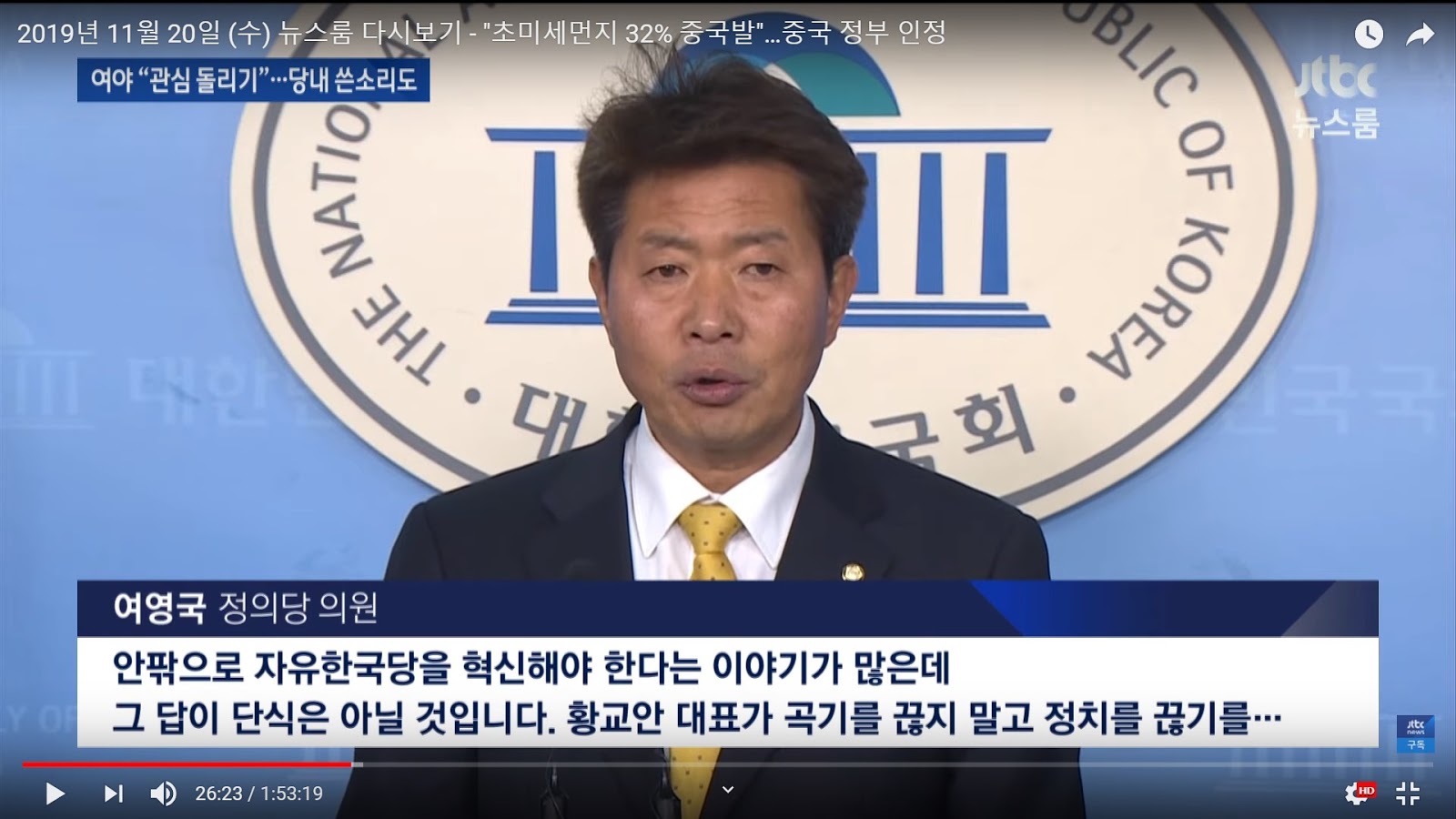
(Source- JTBC News, 11.20) Reo Yeong-kuk, Justice Party, "While there is much talk inside and outside that the LKP must reform, the answer will not be a hunger strike; rather than cutting off food, he should cut off politics."
But back to Hwang's hunger strike. Hwang, The LKP leader and former prime minister under Park Geun-hye is resorting to the old tradition in the Chosun court to make an individual petition to the throne by placing oneself at risk in front of the palace royal hall. This involved the petitioner being subjected to the hardships of nature and the elements until one is either heard by the King and receives an appropriate response or literally dies in the process. Anyone who watches South Korean historical dramas is familiar with these scenes. However, what is curious is why a political party leader finds it necessary to do this when South Korea today is a democracy? Such actions are typically a manifestation of powerlessness and desperation. Yes, there is the dramatic patina of virtue which goes with such scenes where the historical actor risks their life for a principle. It is apparent that Hwang's demonstration is also drama for television, like shaving his head was several weeks ago. Apart from the dramatic pictures, it is certain that Hwang will be making trips to the rest room, and drinking water.
The public venues Hwang has chosen to to make his demonstration are subject to other pre-scheduled events which conflict with his plans. So he had to move from the venue in front of the Blue House to a position on the National Assembly grounds which again had an event conflicting with Hwang's demonstration necessitating another move. When the temperature dropped at night Hwang was seen donning his duck down winter outer clothing and a blanket, taking a departure from the historical practice. It was noted by newscasters that he used a cushion to sit on the hard ground surfaces. So Hwang is not so much placing himself under maximum deprivation or risking his health in an immediate sense as in the customary practice but grandstanding for the cameras. The act isn't going over well. One cannot overestimate the desperate situation the LKP leader finds himself in politically to undertake such posturing. JTBC news commentators and seasoned politicians referred to it as a crisis in leadership. It appears that Hwang may have coordinated this event with the evangelical leader Jeon Gwang- hoon, executive director of the United Christian Conference, who played a key role in the Gwanghwamun demonstrations where he called for the impeachment of Moon Jae-In, "effective immediately." Jeon has been criticized as a demagogue and right wing extremist.
Hwang said he's demonstrating against the harm the Moon Jae-in government has done to South Korea, and against the further harm it appears is on the way. Specifically he's referring to fast track legislation to which four other parties have agreed to circumvent LKP stonewalling on legislation during the 20th Session of the National Assembly. In his statement of grievances Hwang addressed the prosecution reform particularly the provision for a specific office for investigation of crimes by public officials. Hwang asserted this was a means for Moon Jae In to punish those who oppose him. Secondly, the fast track proposal increasing the number of proportional seats and reducing district representation seats, if approved on the Assembly floor is virtually certain to adversely affect the number of LKP representatives. This proposal according to Hwang was Moon Jae In's design to "serve himself." Yet this will benefit the under represented smaller parties in the National Assembly who support the reform. This is the real crisis for the LKP. Democracy in the form of proportional representation is rearing its ugly head. The far right conservatives in Hwang's party lose even more political power adding insult to injury after their collapse in the last election cycle. Hwang has adopted the GSOMIA issue as well. He's making the US argument on behalf of intelligence sharing with Japan. It's unlikely this will earn many political points in light the humiliating treatment South Korea has received from Abe's Japan over the past few months, and the continuing "shameful," browbeating the South Korean people have witnessed from US officials in the last few weeks.
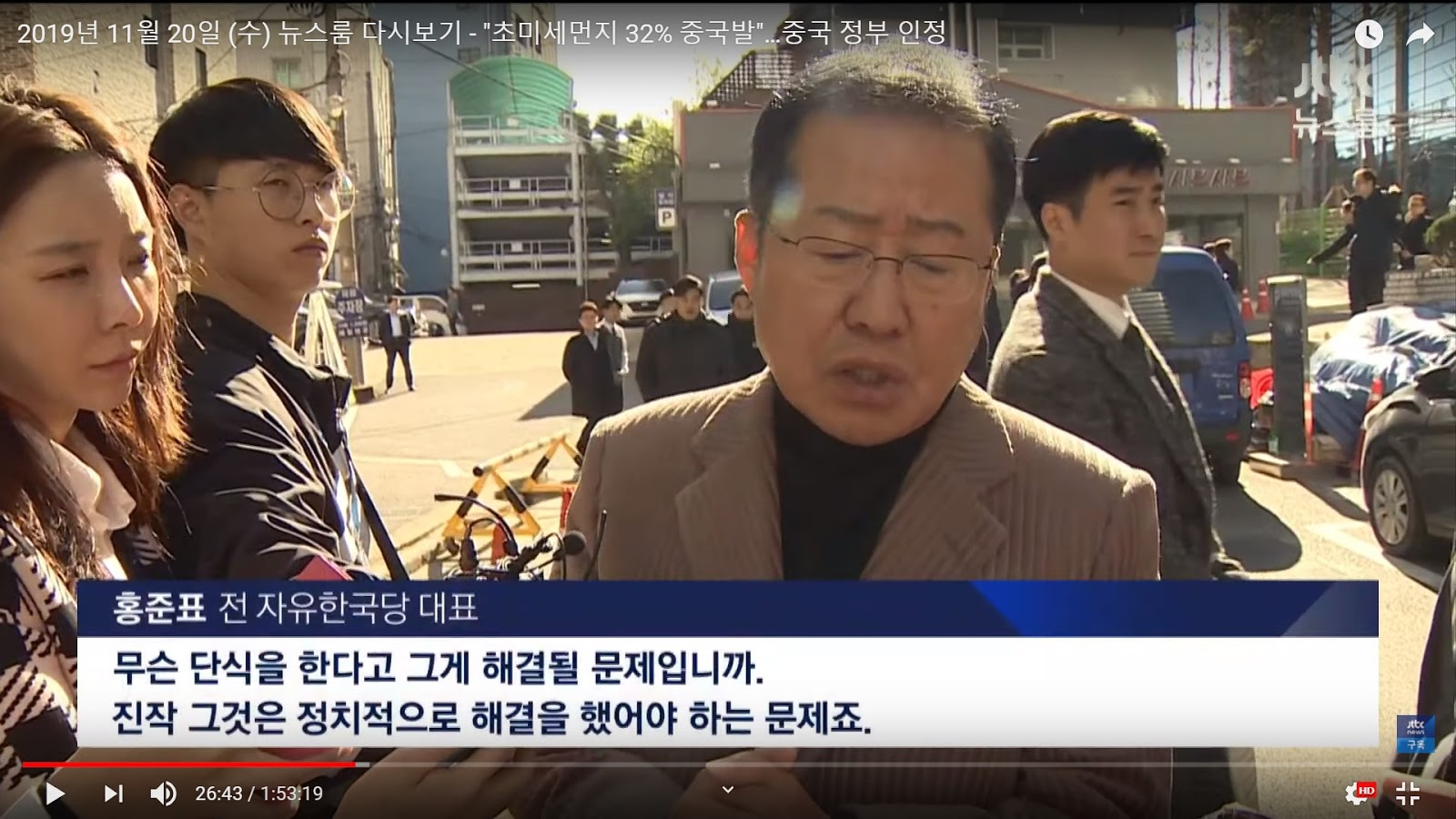
(Source- JTBC News, 11.20) Hong Joon-pyo, "What sort of hunger strike? Will a hunger strike solve a problem? Before that there is the problem that must be politically solved."
It's not suprising that criticism of Hwang's hunger strike is coming from all quarters including his own party which is showing some signs of fracturing under the pressure. Obviously there would be criticism from the incumbent party in power, the Democratic Party which regards Hwang's hunger strike as a nuisance born of anxiety on his part. The Justice Party representative suggested that rather than quitting food Hwang should quit politics. Hong Joon-pyo the former leader of the LKP, with an eye to his successor in interest's faltering position, suggested that Hwang as a the party leader should be engaged in a political solution rather than a hunger strike. He also stated that Hwang's hunger strike wouldn't budge Moon Jae-in one bit. He made very critical statements about the matter on line. Another member of the LKP cited Hwang's action as more evidence of a leadership crisis in the LKP which requires the establishment of a new conservative party. A spokesperson for the Barun Mirae Dang on the center right, in favor of fast track legislation, was similarly critical of Hwang's leadership.
US diplomatic blunderers in South Korea compared to Alice Roosevelt

(JTBC News- 11.19) Alice Roosevelt riding a stone horse statue at the Memorial for Empress Myeongsong, acting as if she were "riding a carousel at an amusement park." The picture is from the Cornell University Library collection.
Alice cavorted around Seoul being treated like an American princess after Teddy Roosevelt had already sold out Korean sovereignty to the Japanese at the Treaty of Portsmouth September 5, 1905. The great powers bargained away Korea's sovereignty to Japan to serve their own imperial interests. Russia actually was the only power to resist the Japanese, but that was because they had wanted to make Korea a Russian domain. The Russians lost the Russo-Japanese War and had to sign the Portsmouth Treaty arranged by President Roosevelt, in which Japan's dominance in Korea was acknowledged. Later in September 1905, King Gojong still thought the US might be of help to avoid the Japanese takeover of Korea when President Roosevelt's daughter, Alice Roosevelt, visited Korea. Other high ranking US diplomats who had been traveling with Alice through other Asian capitals didn't bother to come. Korea's fate was already cast.
Alice attended a formal dinner presented in her honor by the "Emperor," and rode in his palanquin through the streets of Seoul. Her memorable faux pas was to jump on the back of a stone horse statue at the memorial mound of Empress Myeongseong who in 1895 had been assassinated by the Japanese. At least Alice had an excuse. She was immature, so the editorial goes. Alice wrote that Emperor Gojong of Korea, small in stature, cut a piteous figure. Here we are more than a hundred years later.
What is the excuse of the US Ambassador to Seoul Harry Harris, who is among those who have been jawboning Korean officials for weeks? Secretary Esper? Mr. DeHart? It isn't the 1950s or the end of the Russo-Japanese War during the heyday of imperialism. South Korea is no longer run by the conservative heirs of pro-Japanese dictators and their cronies. The "experts" are giving team Trump in Asia very bad advice. South Korea isn't going to "get over" it's dispute with Japan in the manner they have in mind. Nor will it cave to US extortion. And that is what it is being called in South Korea, extortion. The behavior of US officials is described as "shameful."
Esper, Harris, DeHart, along with Chairman JCS General Milley, USFK Commander General Abrams, and others are making unreasonable demands with no basis in existing agreements. Ambassador Harris has been buttonholing members of the Korean National Assembly, particularly the opposition members making the absurd demand for five times the current South Korean cost sharing contribution to US defense costs in Korea. Also, they are pressuring South Korea to cave in to US demands to participate in, what is in effect, a new defense alliance with Japan and other US allies against China throughout the Indo-Pacific. The US is blatantly taking up for Japan in the continuing political and economic dispute between the two countries. It's pretty clear that without some concessions by the imperial minded Abe, the GSOMIA agreement for sharing military information will lapse on the 23rd as scheduled. The Chair of the Intelligence Committee in the National Assembly, Lee Hye-hoon, referred to Ambassador Harris' repeated demands as rude and unreasonable. The US cost sharing demand has been dead on arrival since September. US diplomats and generals must be stone deaf.
The South Korean government has no intention of allowing the US or Japan to dictate their foreign policy. The South Koreans have repeatedly confirmed their commitment to the alliance with the United States but they are not capitulating to absurd or unreasonable demands.
As US troops leave Seoul, a peek inside Korea's Yongsan military base
As US troops leave Seoul, a peek inside Korea’s Yongsan military base
The Yongsan military base was manned first by the Chinese then the Japanese and finally the Americans
As US troops move to Camp Humphreys, people are getting a glimpse inside
Park Chan-kyong SCMP
Published: 3:00pm, 9 Nov, 2019
To date, Yongsan’s population has dropped from more than 25,000 to about 4,000. Its last major unit is set to move in the near future after a new hospital at Camp Humphreys opens in a few months, allowing the medical facility in Yongsan to close.
The tree-lined Yongsan garrison site, which contrasts with the bustling cement metropolis, will be transformed into a public park similar to New York’s Central Park.
South Korea paid US$10.8 billion to build the massive new US garrison in Pyeongtaek, billed as America’s largest overseas military base, occupying 15 sq km. When the land is returned, the US will have given back 178 sq km by consolidating more than 91 bases throughout the country into the two regional hubs of Pyeongtaek and Daegu...
https://www.scmp.com/week-asia/politics/article/3036879/us-troops-leave-seoul-peek-inside-koreas-yongsan-military-base
Article on the history of Yongsan Garrison in Seoul, the protracted US base transition in South Korea, and its significance. Some nice photos with the report of interesting sites on the base compound. Not covered in the article is the environmental damage done to the land within the base and what the plans are to remediate and pay for the damage. Nor is there a discussion of the plans for construction of the new US embassy compound there and their progress or the associated USMC security unit and heliport associated with the new embassy compound.
Washington, DC
January 24, 2017
The Department of State selected SHoP Architects of New York, New York for the design of the new U.S. Embassy complex in Seoul, Korea.
The multi-building complex will be situated on a 19.5-acre site in the Yongsan district of Seoul. The new complex will include a Chancery, support facilities and a Marine Security Guard Residence...
https://kr.usembassy.gov/012417-bureau-overseas-buildings-operations-announces-architect-new-u-s-embassy-seoul-korea/

Overhead photo of Yongsan in Seoul Korea shown with hazardous hydrocarbon spill sites. JTBC News June 30, 2018
"JTBC is reporting 84 recorded incidents of diesel and JP spills at the former Yongsan base. Benzene levels in the water table are 162 times safe limits. It's clear from the MOU on environmental impact remedial measures agreed to by the US under the SOFA, that something needs to be done to correct the situation."
https://civilizationdiscontents.blogspot.com/2018/06/pollution-left-by-us-armed-forces.html
The Populist Pastor Leading a Conservative Revival in South Korea
The Populist Pastor Leading a Conservative Revival in South Korea
By Choe Sang-Hun
Nov. 8, 2019 The New York Times
Whatever else the Rev. Jun Kwang-hoon may be called, there is no denying that the 63-year-old Presbyterian pastor has become a force to be reckoned with in South Korea, spearheading a conservative pushback against President Moon Jae-in. Once dismissed as a crank, Mr. Jun has attracted huge crowds to his rallies in central Seoul in recent weeks, forcing Mr. Moon’s justice minister, Cho Kuk, to step down. He is also demanding Mr. Moon’s resignation, calling it “an order from the Lord.”
more:
https://www.nytimes.com/2019/11/08/world/asia/jun-kwang-hoon-pastor-.html
I did a write up related to this character and far right extremism and dictator reverence posed by the Gwangwhamun demo in Seoul, South Korea Oct. 3:

(Source- JTBC News, 10.3) Jeon Gwang Hoon, executive director of the United Christian Conference, calls for the impeachment of Moon Jae-In, "effective immediately." He also blasted "those expletive deleted illegally impeached Park Geun Hye and instigated the press" (against her). Minister Jeon was criticized for soliciting contributions for himself citing the biblical rewards in store for contributors, while proverbial "men in black" stood guard nearby.
More at the link:
https://civilizationdiscontents.blogspot.com/2019/10/initial-impressions-of-anti-cho-guk.html
South Korea- Constitutional Confrontation?
Hwang Kyo-ahn Has it Both Ways
The former prime minister is suspected of considering martial law plans in 2017, he seeks to take political credit from those who would have welcomed it, while denying he had any role.
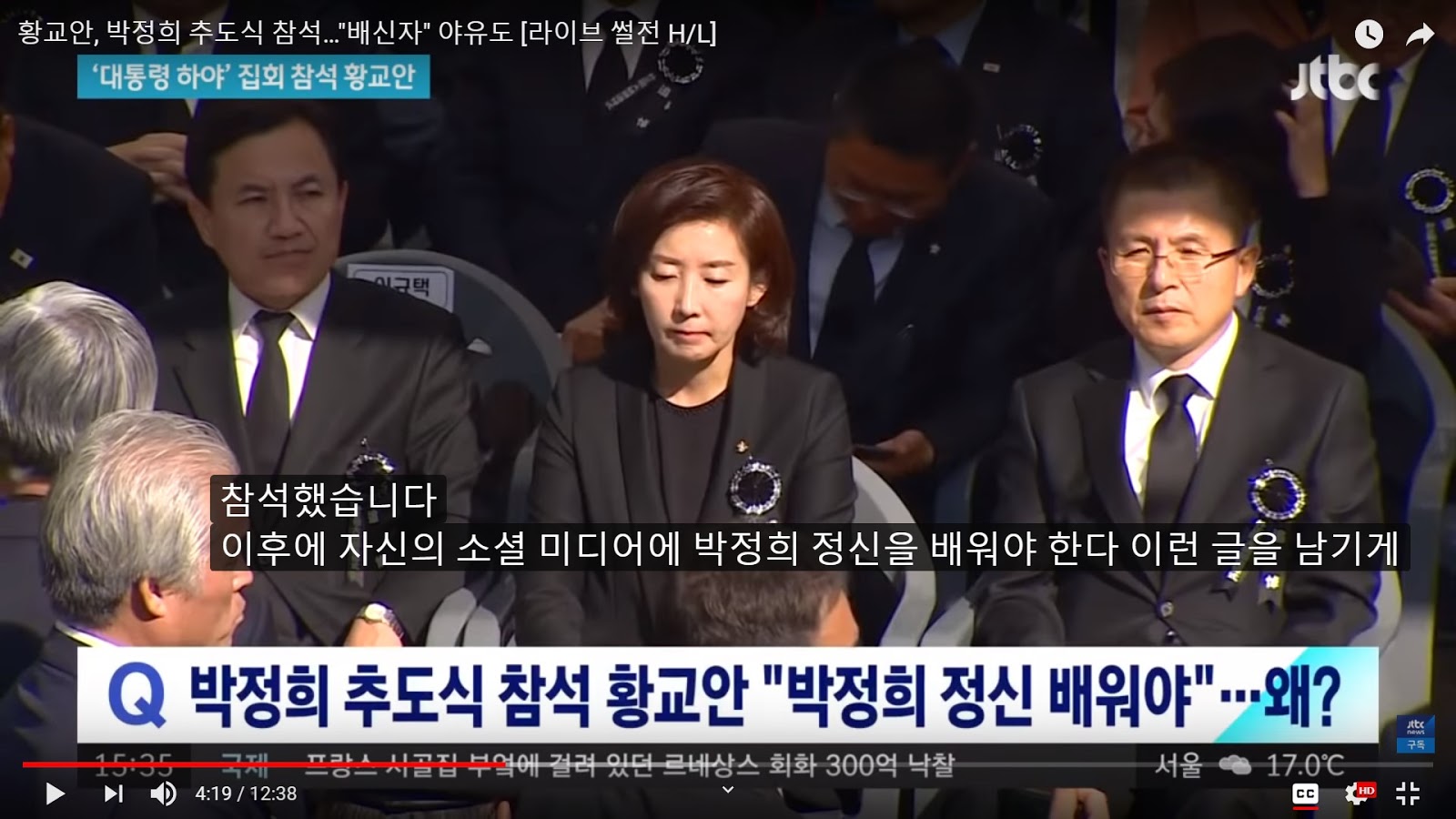
(Source- JTBC News, 10.28 ) Hwang Kyo-ahn, former prime minister, and leader of the Liberty Korea Party, (right); and Na Kyung-won, National Assembly floor leader of Liberty Korea Party, (center) attend 40th Memorial Service for assassinated dictator Park Chung-hee (10.26). Hwang is quoted as saying, "we must learn the spirit of Park Chung-hee."
There are recent reports on the disclosure of new evidence, National Security Council documents, detailing preparations for the implementation of martial law during the waning days of the Park Geun-hye impeachment proceedings. During this time in February and early March 2017, it appears from the documentation, that the commander of the Defense Security Command, prepared plans to implement martial law, to avoid the fall of the conservative Park Geun-Hye administration. The official National Security Council documents are circumstantial evidence that the then acting president and prime minister Hwang Kyo-Ahn, had knowledge of the plans, and perhaps as acting chair of the NSC, played a role in their formulation. Hwang has made flat denials of any knowledge of such preparations for the implementation of martial law to save the conservative administration. At the time, democratic opposition protesters were carrying out massive demonstrations in Gwanghwamun and other locations in South Korea during the pendency of the Park Geun-hye impeachment process. Other observers have attempted to belittle the significance of the martial law plans, suggesting that at worst, they were only contingency plans to deal with public disorder rather than a coup d'etat to overthrow the constitutional order. It is not clear what happened during the very last days preceding the conviction of Park Geun-hye by the Constitutional Court. The critical witness to the formulation of the martial law plans, and their potential execution was the commander of the Defense Security Command, Cho Hyun-cheon ( 조현천 기무사령관 ). He was the key person involved in their development. It is important to note in this regard, that the same role was played by former president Chun Du-won as the Defense Security Command commander after the assassination of Park Chung-hee (Park Geun-hye's father) forty years earlier after the fall of the Yushin Constitution. The coup planning DSC commander Cho Hyun-cheon, in question now, fled South Korea, and his whereabouts are allegedly unknown. Interpol has refused to issue a warrant calling for his arrest citing a policy not to use legal process in political cases. All of this is according to an interview of Im Tae-hun of the Military Rights Center ( 임태훈 군인권센터 ) who represents the whistle blower who leaked classified NSC documents. *
* https://news.v.daum.net/v/20191021211005908, (transcript of youtube podcast) MBC radio interview 10.21
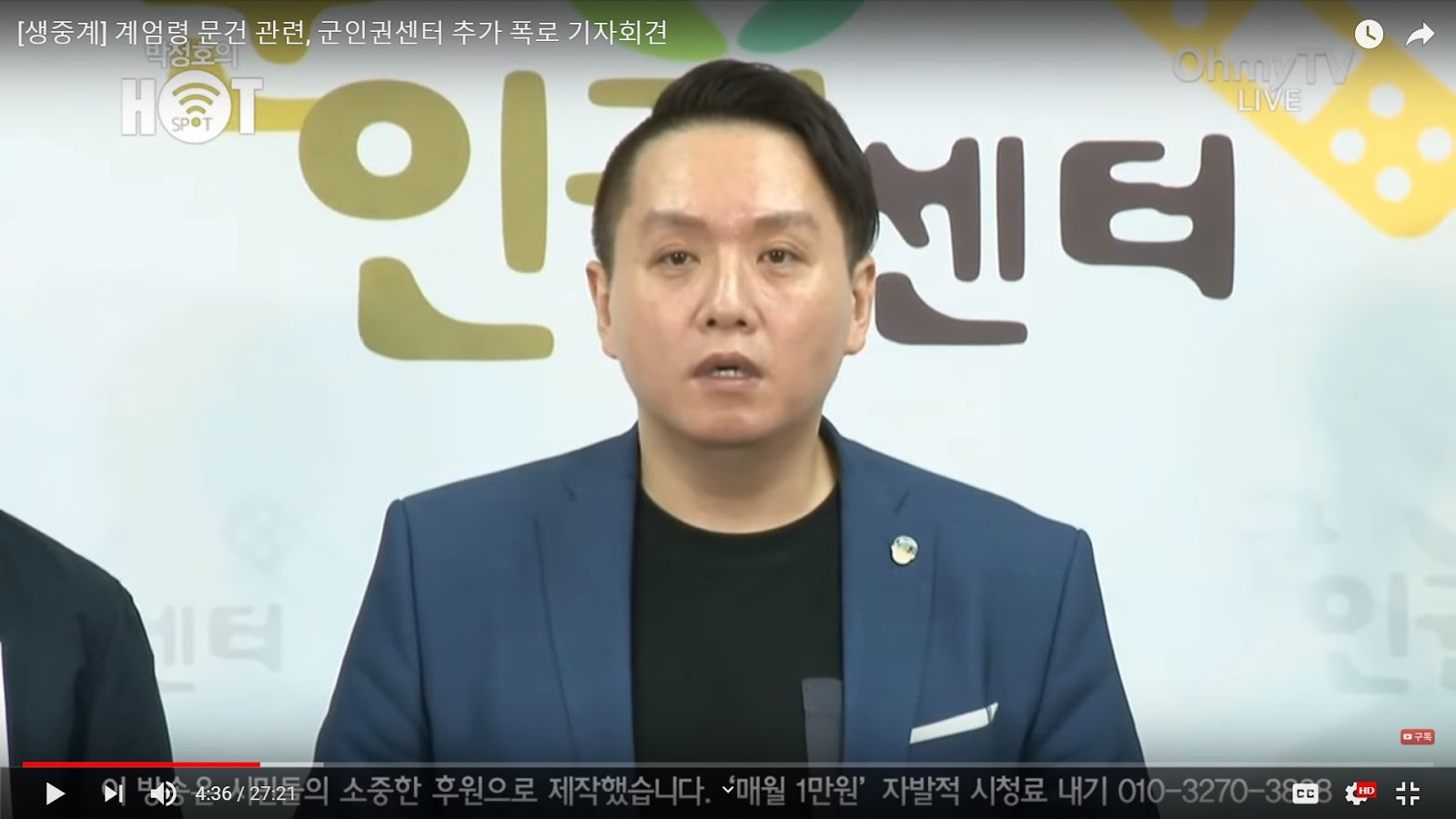
(Source- OhMyNews 10.30) Im Tae-hun press briefing at the Military Rights Center.
Significant detail in the 2017 martial law plans in question called for various army units to deploy to the Gwanghwamun plaza site of the so-called "candlelight" demonstrations, multiple major university campus locations, strategic bridges in Seoul, and to Yoido, the location of the National Assembly. All these tactical moves with a view toward dispersing demonstrators, arresting activists and political opposition leaders, blocking movements of citizens, and preventing the normal governmental functions of the National Assembly.
In an ironic turnabout, the Liberty Korea Party currently in its role of political opposition, has organized demonstrations at Gwanghwamun against the current Moon Jae-in, democratic administration. Although LKP floor leader Na, gave herself an award for toppling the Justice Minister Cho Guk from his newly appointed position, it is likely that the Chief Prosecutor's office is the more responsible party. After attending an overnight Gwangwhamun demonstration this weekend, LKP leaders Hwang and Na, attended the 40th memorial ceremony for former president Park Chung-hye. The former president has been credited with modernizing the Korean economy while ruling South Korea with an iron fist in a military like social order. The former dictator was also credited with "normalizing" relations with Japan, which the blog has described elsewhere. This modernization effort was characterized by self serving corruption by the former Japanese trained military officer and his pro-Japanese political and business cronies. The LKP represents the heirs of this Park political tradition. These interests have consistently blocked efforts to come to terms with the Japanese colonial legacy in Korea for decades.
Cho Guk recently had been appointed Justice Minister to reform the national prosecutor's office. It appears that there was an element of bias in prosecution resistance to the widely supported initiative to check the unbridled power of the "republic of lawyers." The apparent corruption of Cho Guk's family members gave them a lever to force him out of office. The prosecutor's office was accused of multiple leaks by some journalists which added to the political unrest in the streets. On the other hand, Im Tae-hun, who represents the martial law plans whistle blower, asserts that the Chief Prosecutors Office has deliberately sat on documentation that reflects suspicion on Hwang Kyo-Ahn complicity. The far right opposes fast track reform while an agreement has been reached by four political parties to fast track the legislation so as to get a floor vote during this session of the National Assembly.
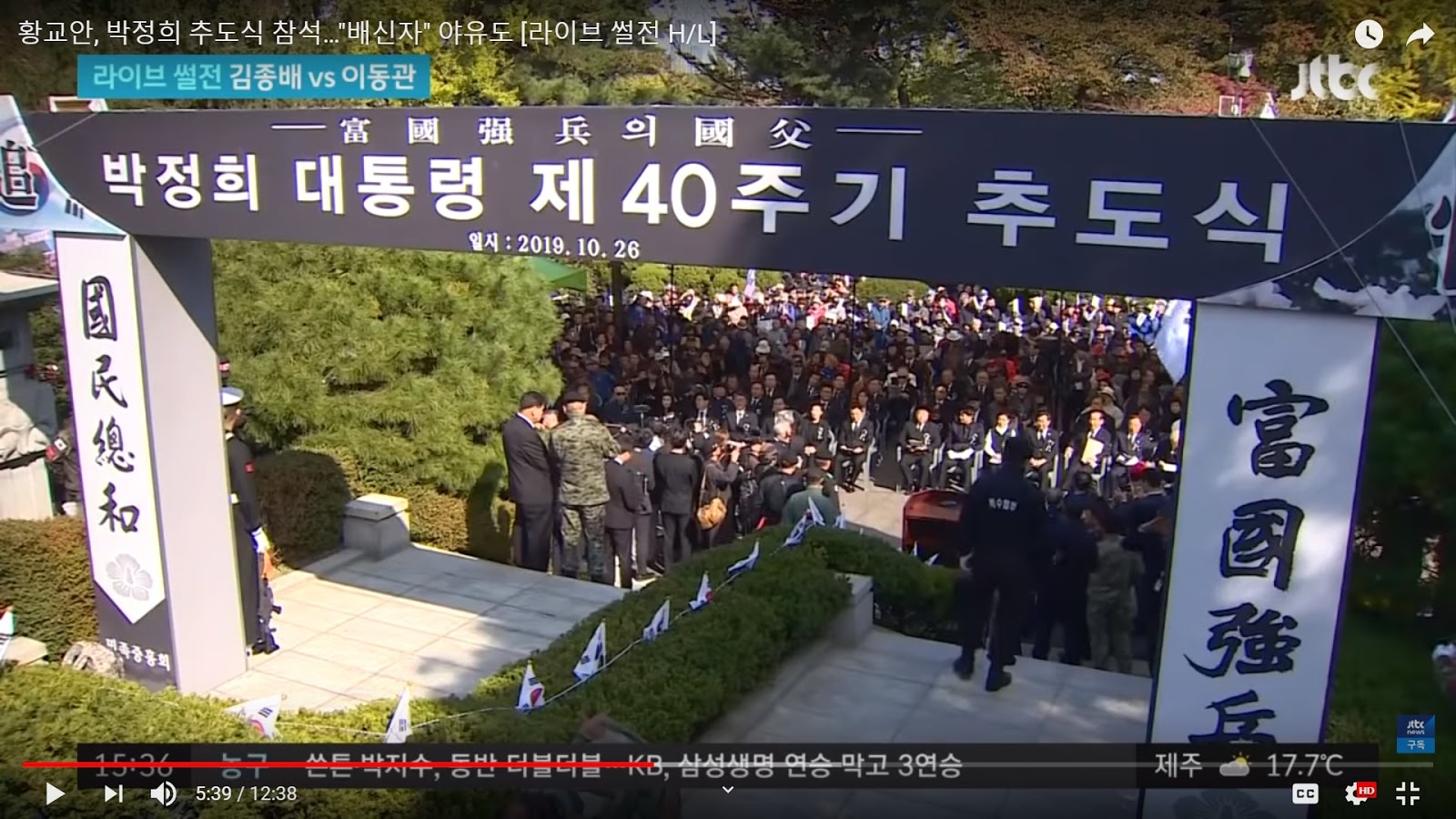
(Source- JTBC News, 10.28 ) Hwang Kyo-ahn, leader of the Liberty Korea Party, and Na Kyung-won, National Assembly floor leader of Liberty Korea Party, are front and center at the 40th Memorial Ceremony for the former President Park Chung-hee, 10.26. The sign above the portal says refers to President Park Chung-hee's philosophy as a father of the country, a proper country has a strong military.
Ironically, Hwang's presence at the memorial service for the former dictator was marked notably by some boos and jeers calling him "traitor." It is notable that the impeachment of Park Geun-hye took place while Hwang was acting president. She was tried under impeachment proceedings. Apparently some in the conservative audience thought he should have done something about it while he had the opportunity. The peaceful transition of power by impeachment and free elections, is viewed as a betrayal of the ultra far right elements attending not only the Park 40th Memorial but also the current Gwanghwamun demonstrations sponsored by the LKP: protestant evangelicals that elected Park Geun-hye; and the far right pro-dictator elements. Hwang has been reported to have said things such as we need to remember "Park's leadership concerning the economy during a difficult economic period of which there are many examples." Also "we must learn the spirit of Park Chung-hee." As to the anti-Moon Jae-in demonstrations calling for his arrest and ouster, Hwang said the demonstrations reflect the "anger of the people." Political commentators noted that it is evident that the LKP leadership intends these demonstrations continue. There were other cynical observations about the role of churches and the party apparently furnishing free food as inducements to gather. One expert said, Cho Guk's fall was no cause to relax, "they caught the rabbit in the house, now it's time to catch the rabbit in the mountain." Another observation was that South Korea may only be at the half way point in this constitutional confrontation.
Meanwhile in another late news item, it was reported that leader Na, appeared at press briefing with the National Assembly leader, Moon Hee-sang, and two other party leaders, to announce that the Assembly committee handling fast track legislation has referred a prosecutorial reform bill to the floor for a vote. During the news item it was noted that the representatives from the center right Barun Mirae Party, and the Justice Party were demonstrating on the floor for a vote to fast track the Legislative reform bill first. As the blog has noted previously, it is this extension of proportional (nation wide) seating that is expected to decrease the number of district seats held by the Liberty Korea Party. Until this matter is resolved, the street politics and political theater in Seoul is likely to continue unabated. Na said something like this to the National Assembly leader, "I'd rather stop this unconstitutional fast track process than hold hands" (for a photo shoot). The leader responded, "I'd rather hold a wrist, than be grabbed by the ankle." The latter a reference to the continual obstruction of legislation by the LKP opposition. LKP physical obstruction of committee efforts led by Na last April is currently subject to an investigation by prosecutors.
Profile Information
Member since: Sat Mar 14, 2009, 09:45 PMNumber of posts: 3,299